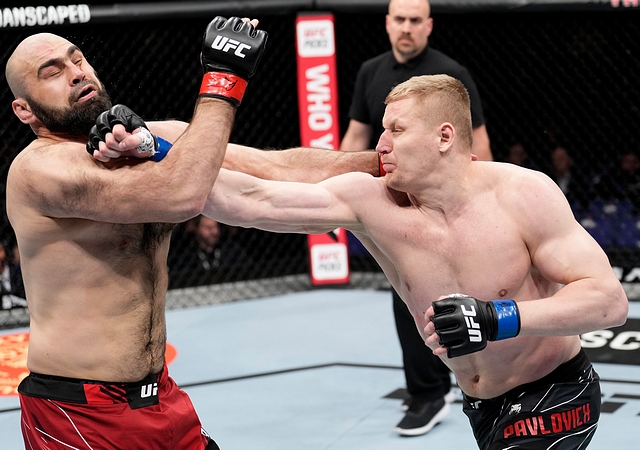UFC fans hear a fair amount about devout Muslim fighters, particularly the Dagestanis. Khabib and Islam have won renown, and their excellence brings credit to their faith.
We hear a good deal less about Christian champions. So I thought to add some perspective.🧵




We hear a good deal less about Christian champions. So I thought to add some perspective.🧵




The highlighting of great Muslim fighters and the relative silence about Christian one leave one with the vague impression that Islam is the dominant religion of the sport and contribute to the larger narrative that Christianity is not for hard men.






This is not the case. There have been and still are more than a few Christian champions and top-level contenders. Here's a very unofficial list:
Ilia Topuria—
The newly crowned featherweight champion is an Orthodox Christian from Georgia who has found a home in Spain. He is on the shortlist for the most skilled boxers in the sport. His faith is all over his X account.
The newly crowned featherweight champion is an Orthodox Christian from Georgia who has found a home in Spain. He is on the shortlist for the most skilled boxers in the sport. His faith is all over his X account.
https://twitter.com/Topuriailia/status/1763547013616980302
Charles Oliveira—
Here’s the former lightweight champion, the man who holds the record for most finishes in UFC history, offering a striking prayer as he cuts weight before a fight.
Here’s the former lightweight champion, the man who holds the record for most finishes in UFC history, offering a striking prayer as he cuts weight before a fight.
https://twitter.com/xNIGHTMAREZZx/status/1759852075691688080
Jon Jones—
Perhaps the greatest fighter in the history of the sport, Jones famously drew a reprimand from Dana White when he won the light heavyweight title and thanked his Lord and Savior Jesus Christ.
Perhaps the greatest fighter in the history of the sport, Jones famously drew a reprimand from Dana White when he won the light heavyweight title and thanked his Lord and Savior Jesus Christ.
(Jones has a troubled past, no doubt—I don’t offer him as an ideal Christian. But you know what the Lord said: "They that are whole need not the physician: but they that are sick. I came not to call the just, but sinners to penance.")
Sergi Pavlovich—
Before losing to Aspinall recently, the Russian heavyweight had established himself as one of the most frightening men in the UFC, finishing six straight opponents in the first round. The man crosses himself like a maniac when he finishes an opponent.
Before losing to Aspinall recently, the Russian heavyweight had established himself as one of the most frightening men in the UFC, finishing six straight opponents in the first round. The man crosses himself like a maniac when he finishes an opponent.
Beneil Dariush—
Dariush is one of the most outspoken Christians in the fighting game. Prior to losing to Oliveira, Dariush had won eight straight fights and appeared to be on his way to a title shot.
Dariush is one of the most outspoken Christians in the fighting game. Prior to losing to Oliveira, Dariush had won eight straight fights and appeared to be on his way to a title shot.

Aside: I once saw an interview with Dariush in which he was asked how he squares his faith and his profession. The very premise of the question annoyed me. Is it preferable to be a Christian banker or bureaucrat than a Christian fighter?
Wonderboy—
Kickboxer Stephen Thompson is probably the most wholesome fighter on the roster, clearly a believer. At one point in his career, Thompson was 13-1 and fought welterweight champ Tyron Woodley to a draw. In a previous career as a kickboxer, Wonderboy was 57-0.
Kickboxer Stephen Thompson is probably the most wholesome fighter on the roster, clearly a believer. At one point in his career, Thompson was 13-1 and fought welterweight champ Tyron Woodley to a draw. In a previous career as a kickboxer, Wonderboy was 57-0.
Benoit St Denis—
As for up-and-comers on a crash course with greatness, there's Benoit St Denis, the official favorite fighter of then Chivalry Guild.
As for up-and-comers on a crash course with greatness, there's Benoit St Denis, the official favorite fighter of then Chivalry Guild.
https://twitter.com/ChivalryGuild/status/1739681808235761953
Bo Nickal—
Another up-and-comer and likely future champion is Bo Nickal, the legendary college wrestler turned MMA stud. His X bio reads: Jesus+Nothing=Everything.
Another up-and-comer and likely future champion is Bo Nickal, the legendary college wrestler turned MMA stud. His X bio reads: Jesus+Nothing=Everything.
This is not to mention the previous generation of fighters, which includes some devout legends: Silva, Yoel, Chael, Fedor (not UFC, but still), etc.




To sum up: the old claim that the Christian faith makes men soft is 👇...
Postscript:
It's not meant to be a definitive or exhaustive list. Please add anyone I'm missing!
It's not meant to be a definitive or exhaustive list. Please add anyone I'm missing!
• • •
Missing some Tweet in this thread? You can try to
force a refresh















